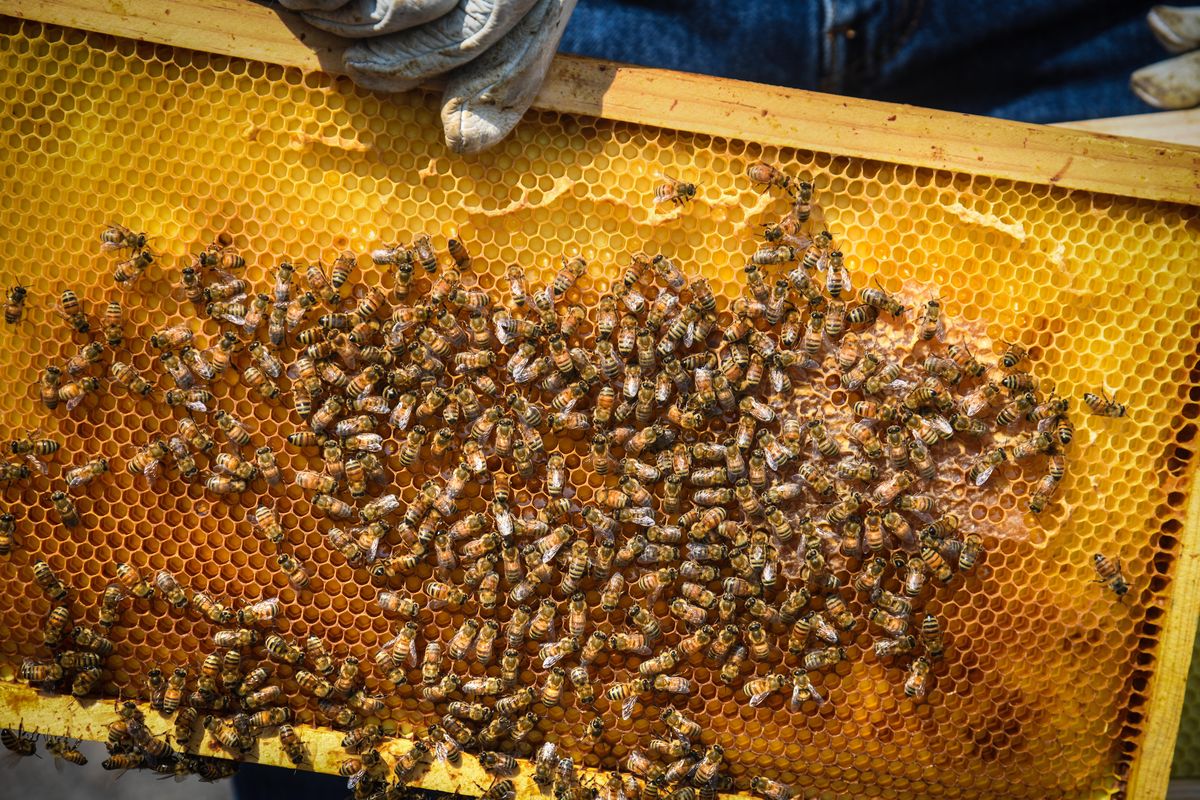Airway Heights prison beekeeping program inspires sustainability and self-improvement

Down a quarter mile or so of concrete path and past groupings of square, metal buildings, there’s a small oasis at the southwest corner of Airway Heights Corrections Center.
Birds chirp as butterflies and hummingbirds flutter from row to row of vegetables and flowers. A compost pile to the west recycles food waste for future fertilizer.
It’s all a part of the Washington Department of Correction’s Sustainability in Prisons Project that started in 2003.
And the newest addition at AHCC is along the southern barbed wire fence: 15 wooden boxes are teeming with thousands of bees making honey.
The prison had gardening and composting programs for years, but in spring 2016, officials approached master beekeeper Jim Miller with a proposal to create a cutting-edge apprenticeship program at the prison.
Miller said he didn’t hesitate.
“One of the reasons I’m here for is to help somebody else; That’s what this is about,” Miller said.
Now, after the example set by AHCC and a few other corrections centers, most of the state’s prisons have beekeeping programs.
The first set of individuals Miller worked with turned out to be more apprehensive of the bees than he was about working with inmates.
“I was really afraid of it,” said journeyman beekeeper and AHCC beekeeping club president Luis Cruz, who has been with the program since the beginning. “Now, with the knowledge of Mr. Miller and how he managed the bees, it’s amazing.”
In addition to his time, Miller donated almost all of the supplies for the hives. It costs somewhere between $300 and $400 to get a hive started, including the wood enclosure and food.
About 50 inmates have gone through the apprentice training program initially taught by Miller. Fifteen of them have since graduated as journeyman beekeepers and now lead some classes. They help Miller instruct others.
“I see my journey at this place as a school,” Cruz said. He added later, “I like to teach; it’s one of the things I’ve discovered about myself.”
Since there are about 2,100 inmates at AHCC, the program is highly selective. The apprentices have to complete courses in sustainability and behavioral intervention as well as have no recent violent infractions. After they are screened, they sign an agreement committing to the program and following the rules.
“I had the commitment to change, to turn my life around and be a different person,” Cruz said. “And be a difference for not only this compound, but for my community when I get out.”
AHCC associate superintendent Kay Heinrich, who oversees prison programming, said this is a product of creating a culture of education and self-improvement at the prison.
“Everyone becomes so engaged and it’s like, ‘Oh my gosh, I am smart. I can do this,’ ” she said. “And then people start believing in themselves, and when people start believing in themselves, they believe that they can change.”
The journeyman beekeepers go out to the hives one to two times a week to check on the bees. The 10 hives, each with 50,000 to 60,000 bees, can fill with honey in as soon as a week. Some of the honey stays at the prison to use as gifts, and some is donated to local organizations.
Beekeepers also are raising queen bees in 5 nucs, short for nucleus, to give to start new hives at other prisons around the state. This helps support beekeeping as honey bee colonies continue to die at increasing rates.
The presence of the bees helps pollinate the adjacent garden, which contributes to the food the prison serves and donates to other organizations. At the end of the season, inmates gather seeds from the produce and the flowers to replant and donate, too.
“It’s all about sustainability here,” Heinrich said.
The inmates also worked with Washington State Beekeepers Association member Joe Miller, no relation to Jim Miller, to update the journeyman education curriculum used by all beekeeping groups in the state. Most beekeepers didn’t have the time to do so because honey and wax production is a full-time or second job for them.
“The journeyman curriculum was an amazing feat of these guys and Joe Miller,” Heinrich said. “They did all the work.”
From journeyman, the next step is becoming a certified master beekeeper. So, updating that statewide curriculum is on the Airway Heights beekeeping club’s to-do list now.
Cruz said his ultimate goal is to become a master beekeeper and apply what’s he’s learned in his community after his release.
“That’s one of my dreams,” Cruz said. “Before beekeeping, I just wanted to do my time. I didn’t have any dreams at all.”